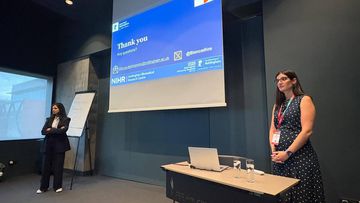MS Awareness Week 2023: Whole-person support
NewsSupported self-management often impacts people beyond their MS, helping with their overall health and wellness, improving outcomes for comorbidities or reducing the likelihood of these arising. In Joanne's case, though, it was not support to manage her MS specifically which had the biggest impact on her overall health.
Joanne talks a lot about a traumatic experience as a young teenager which she never voiced or dealt with until she happened across an MS nurse whilst taking her brother to an appointment. This happenstance meeting was almost 20 years after her diagnosis of MS and was the first time she engaged with services for herself since that time.
'After that first meeting, the team went above and beyond, they came to my house, they really listened to me, they referred me to specialist psychological support and found funding for it from the MS Society, gave me exercises to do. I opened up about my traumatic experiences from childhood and they helped me get on top of my emotional eating. If I hadn't spoken to the MS nurse that day, I don't think I'd be here.'
Being supported by her MS team to address her emotional eating meant Joanne was able to lose weight. She stopped smoking, began to engage in movement and mindfulness practices, and felt more able to enjoy her life and care for those around her.
'I do 'walk a happy mile' - I'm not confident outside my house because of my balance, but I do it at home, using YouTube, holding onto my window sill. I can do six of the 12 minutes at the moment - but I will get there. '
Joanne talks about how a blend of education and practical tools from her MS team has made a real difference in how equipped she feels to self-manage her MS, from fatigue management tools like app TODY to understanding how a urinary tract infection can impact her symptoms.
'I'm always looking for different ways to deal with fatigue - I found an app to put in tasks you need to do and it reminds you - 'Today you need to change the bed' and I do just do that, or if I put a chair in the middle of the room, I can hoover around from that and get all the room done. I try to find little ways to make it possible, and I can share them with others.'
'When I learned that a urine infection can affect my MS it really helped me. My MS team gave me a home testing kit, and if I'm feeling a bit off for a couple of days, I do a test and check my urine to see if a UTI is the reason for it.'
5 tools that can help encourage self–management
Home urine testing kits like the one Ruth Stross's team developed can be rolled out without much impact on resources or costs and can both give agency to people with MS who might have a UTI, and detect UTIs early on, reducing their impact and any risk of hospitalisation
Some apps can be really helpful to certain people - Joanne uses the app TODY to make daily chores manageable while living with fatigue
Smoking cessation tools, like the NHS stop smoking app or signposting to a local 'stop smoking service'.
Signposting to informative / educational resources like Bee well with MS podcast, LivedHealth, or theMSguide can provide information that there's no time to go into in a clinic setting
Signpost to trusted online spaces for people to seek community, advice, support and information from others with MS, like Ciara O'Meara's simple tool (p24).
Related articles
Encouraging excellence, developing leaders, inspiring change
MS Academy was established in 2016 and in that time has accomplished a huge amount with exciting feedback demonstrating delegates feel inspired and energised along their personal and service development journeys. The various different levels of specialist MS training we offer are dedicated to case-based learning and practical application of cutting edge research.


